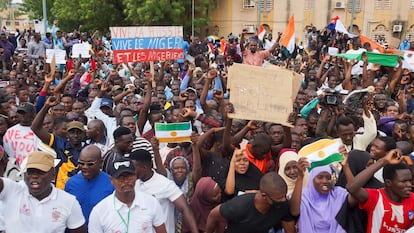The Sahel, a failed region
The fragility of the region’s states — some ruled to military juntas or immersed in civil wars — jihadism and disputes over natural resources have exacerbated instability

The Economic Community of West African States (Ecowas) held a summit Thursday to address its response to the July 26 coup d’état in Niger. In typically diplomatic language, it declared that “all actions are on the table,” including the activation of a “standby force,” which will require time to become operational. In the final communiqué, the organization decided to opt for dialogue with the military junta in Niamey in order to redirect the situation.
With tensions temporarily cooled, a brief analysis of the situation in the Sahel is necessary. This vast area — which stretches from the Atlantic coast to the Red Sea and includes, in the view of some analysts, the Great Lakes region and Somalia — is important to Europe because of its proximity: they are our neighbors’ neighbors.
The instability in the region is largely explained by disputes over scarce water resources and the depletion of pastures, factors that exacerbate tensions between farmers and nomadic cattle-herding ethnic groups. This is coupled with the region’s extraordinary demographic growth and the consequent precariousness of its young people, who have few options beyond the informal economy, dangerous emigration routes to Europe or joining jihadist groups. In this sense, Islamic fundamentalism is not the main trigger of instability, but rather an imported factor.
In this context, the extreme fragility of the Sahel states must be taken into consideration. Some, such as Sudan, South Sudan, and Ethiopia, are immersed in their own civil wars. Others, with self-styled “salvation” military juntas, are unable to resolve the internal problems that supposedly forced them into seizing power. This cocktail of elements provides the ideal conditions for a failed region scenario.
And how have non-African actors responded? France, a former colonial power in the Sahel, is neither willing nor able to become more involved in the region, beyond protecting and expatriating its citizens or other Europeans, especially at a time when the war in Ukraine requires greater focus on Europe and when it knows that it is not going to reap any economic benefit but instead incur the overburdening and distraction of resources from its already bulging defense budget. As President Emmanuel Macron has said, France is seeking to “communitarize” its defense commitments with African allies in the region.
Another relevant figure in the region is the European Union, which conducts the civilian crisis missions EUCAP-Mali (extended until 2025), EUCAP-Niger and the new EU Military Partnership Mission in Niger. The EU’s stance is to pursue diplomatic routes to stabilize the region. The same applies to the United States, which has elected to keep a low profile via negotiations in an attempt to address the situation in Niger or, at the very least, to reduce its effects on the wider region.
The role of the Russian Federation remains to be discerned. Vladimir Putin has been handed an unexpected gift in his confrontation with the West with the opening of a second front. Meanwhile, Europe finds itself forced to devote economic resources and diplomatic efforts to what is happening in the Sahel. The geopolitical vacuum left by the West is being filled by the Kremlin. Wagner’s mercenaries are presented as the spearhead of what has been described as “special military operations” for stabilization, but they are nothing more than a praetorian guard for the new dictators.
Recent events in the Sahel are leading to a reconfiguration of forces in the region. Mali, Burkina Faso, and Guinea support Niger’s military junta, while Ivory Coast, Togo, Benin, and Nigeria, in principle, form a bloc considering military intervention. This division may lead to the tearing apart or the dissolution of Ecowas. Nigeria’s hegemonic role in the organization is decisive, as it is essential for it to remain the regional power in both the Gulf of Guinea and the Sahel. Moreover, its president, Bola Tinubu, faces internal opposition to intervention and has declared that diplomacy must be the priority to resolve the crisis in Niger.
Sign up for our weekly newsletter to get more English-language news coverage from EL PAÍS USA Edition
Tu suscripción se está usando en otro dispositivo
¿Quieres añadir otro usuario a tu suscripción?
Si continúas leyendo en este dispositivo, no se podrá leer en el otro.
FlechaTu suscripción se está usando en otro dispositivo y solo puedes acceder a EL PAÍS desde un dispositivo a la vez.
Si quieres compartir tu cuenta, cambia tu suscripción a la modalidad Premium, así podrás añadir otro usuario. Cada uno accederá con su propia cuenta de email, lo que os permitirá personalizar vuestra experiencia en EL PAÍS.
¿Tienes una suscripción de empresa? Accede aquí para contratar más cuentas.
En el caso de no saber quién está usando tu cuenta, te recomendamos cambiar tu contraseña aquí.
Si decides continuar compartiendo tu cuenta, este mensaje se mostrará en tu dispositivo y en el de la otra persona que está usando tu cuenta de forma indefinida, afectando a tu experiencia de lectura. Puedes consultar aquí los términos y condiciones de la suscripción digital.








































